
Finest Hour 180
The International Churchill Society’s First Fifty Years
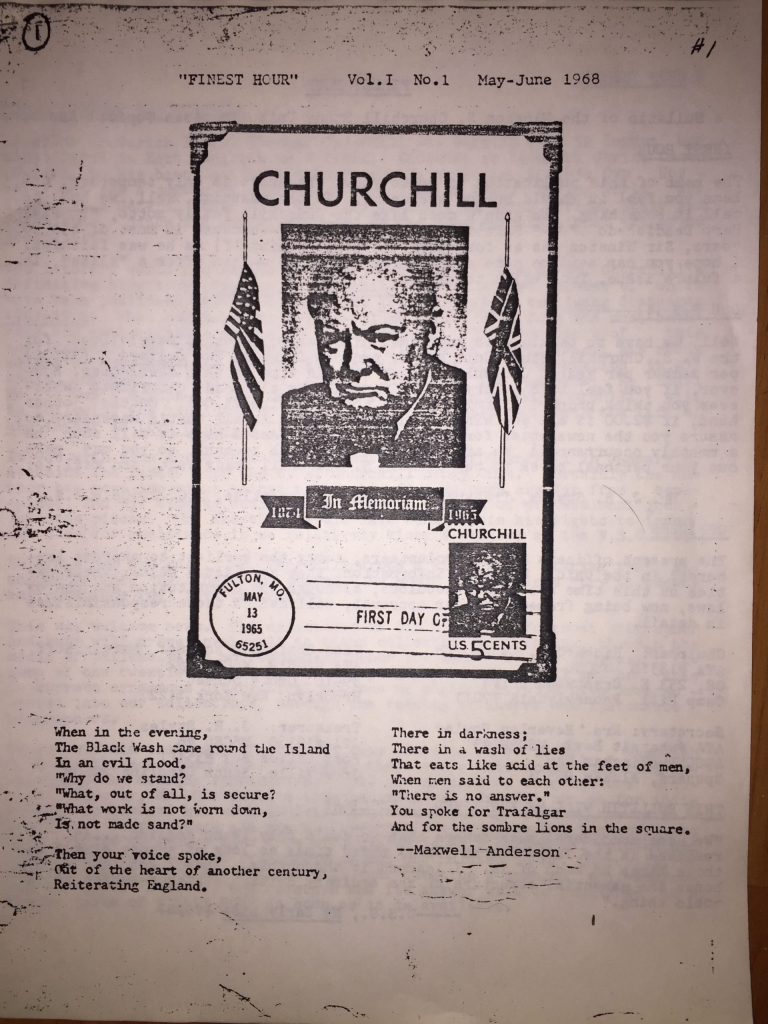
The first issue of Finest Hour, spring 1968
September 15, 2018
Finest Hour 180, Spring 2018
Page 10
By David Freeman
This is the 180th issue of Finest Hour. The operating budget for the first year of what became the International Churchill Society was $180. The first issue of the journal was sent out to the founding members—all twelve of them—in the spring of 1968 with a note that the title was only “temporary” until a better suggestion arose. Fifty years on, the current editor has determined that the cutoff date for suggestions has now passed.
No Black Blots!
The International Churchill Society was founded because Richard M. Langworth did not want to buy phony stamps.
Following the death of Sir Winston Churchill in January 1965, a rash of commemorative stamps was produced in his memory. The major issuers were the quasi-autonomous Arab sheikdoms Ajman, Fujiera, and Sharjah, which printed countless different designs, called “black blots” by philatelists, that were always intended to bilk collectors rather than to frank envelopes. Each design deliberately included many variants so as to entice those obsessed with having “complete” collections.
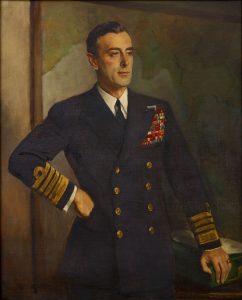
First Patron of the International Churchill Society 1971–1979
The American Topical Association, the presiding US authority on thematic stamps, appeared indifferent to this obvious charlatanism. After contacting other members of the ATA who had expressed an interest in Churchill, Langworth organized the Winston S. Churchill Study Unit (WSCSU) for the purpose of identifying and distinguishing between legitimately issued stamps and black blots.

2025 International Churchill Conference
Finest Hour began as a bi-monthly newsletter for the WSCSU. Dated “May-June 1968,” the first issue ran to seven, mimeographed pages including a three-page checklist of stamps. Annual dues were $2.
In the early issues, most of the articles focused on stamp collecting and included prodigious warnings about those ubiquitous black blots. There was, however, an early movement to publish more generalized information about Churchill. Crucially, the organization reached out to establish a link with the Churchill family from the very beginning. Comments from Randolph Churchill were published in the first issue, and he was made Honorary Member Number One before his untimely death. His mother Clementine and son Winston became Honorary Members Two and Three respectively.
The International Churchill Society
Langworth served as editor for the first thirteen issues and two years of the WSCSU. Then, with issue number fourteen in May 1970, Dalton “Dal” Newfield took over as editor. Dal’s effervescent personality bubbled over the pages of Finest Hour. From his home in Sacramento, California, he began the process of transforming the journal and the organization into more general platforms for the study of Winston Churchill.
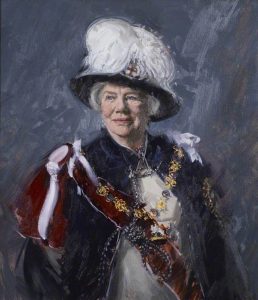
Second Patron of the International Churchill Society 1986–2014
The case was made for a “Churchill Society” modeled after the first such organization, the Winston S. Churchill Society of Edmonton, Alberta. Members of the WSCSU recognized that most Churchill philatelists were Churchillphiles first and stamp collectors second. Changing the nature of the organization, they hoped, would lead to a growing membership.
In the autumn of 1971, issue number twenty-one of Finest Hour was published as the “Bulletin of the International Churchill Society.” Appearing on the cover was Lord Mountbatten, the society’s newest honorary member and later its first Patron. ICS could claim 154 members in nine different countries including Vietnam and Iran. A record meeting of one dozen people took place in Los Angeles at the end of the year. The first meeting of ICS (UK) took place the following year in London at the Charing Cross Hotel.
Death and Resurrection
Despite reorganization and rising membership, the new society still maintained a precarious existence. Even Dal’s prodigious nature was strained when he agreed to serve as president of ICS while remaining editor of Finest Hour. Eventually he was able to turn over editing duties to Stephen King (no, not that Stephen King), but in 1975 King was also constrained to give up the unpaid job in order to attend to personal affairs. For want of an editor, the International Churchill Society was forced to fold after six-and-a-half years.
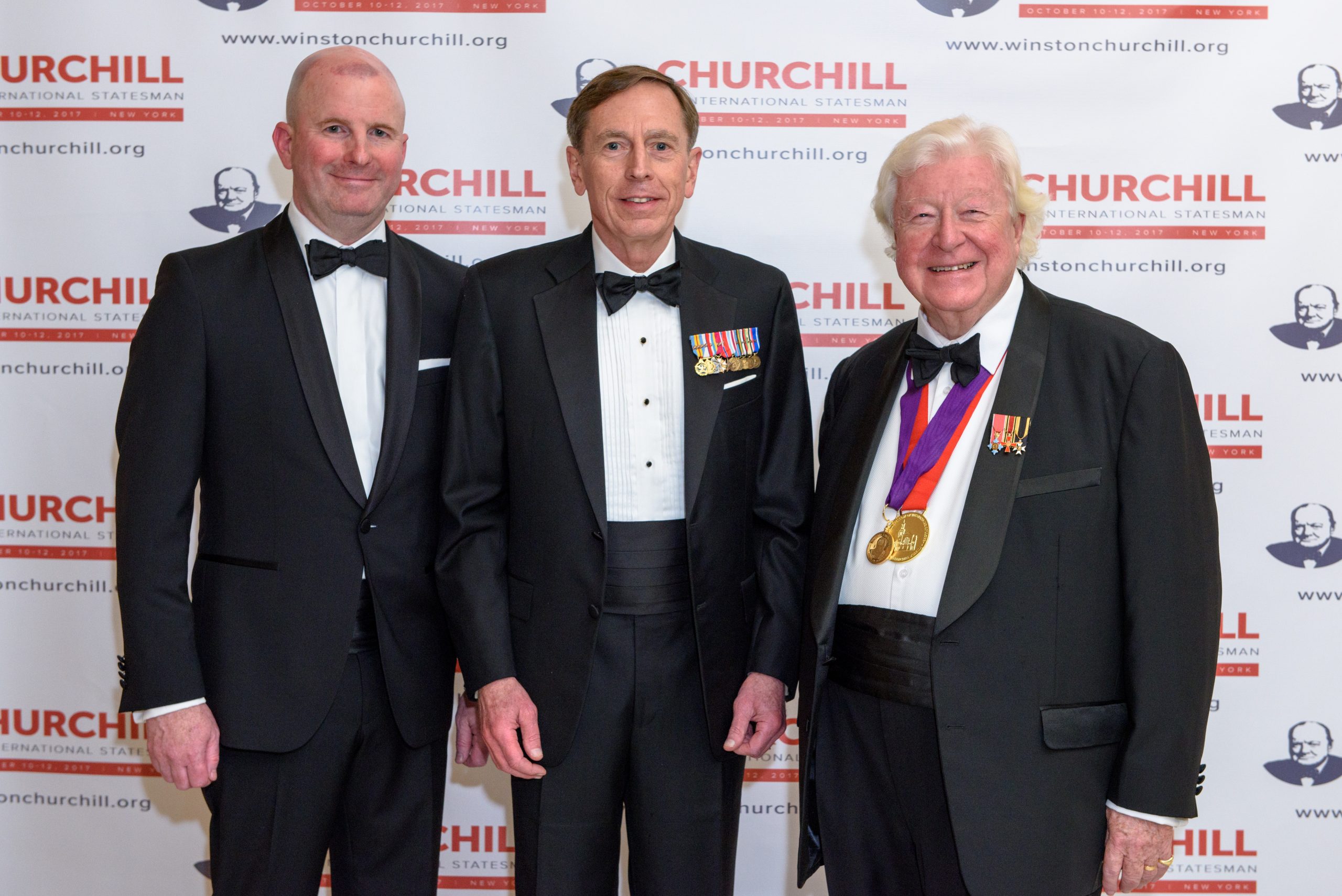
ICS remained dormant for a period equal to its entire previous existence. Then, in 1981 and with Dal’s encouragement, Richard Langworth was persuaded to resurrect the society he had created and to serve once again as editor. During the interregnum, Dal had banked the society’s assets with the happy result that there was almost enough money to cover the expense of the first new issue.
Finest Hour number thirty-three appeared in the autumn of 1981, and the journal has been published continuously as a quarterly ever since. This was the first issue presented in the magazine format that we continue to follow. While still heavily focused on stamps, the new Finest Hour also introduced such regular departments as “Action This Day” and “Riddles, Mysteries, and Enigmas.” Rapidly, the magazine became primarily a journal about Churchill as the philatelic antecedents faded away. The length gradually expanded from twelve pages in 1981 to the fifty-two or more we regularly publish today.
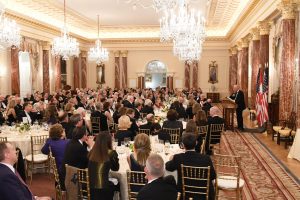
Sadly, only months after the rebirth of ICS, Dal Newfield passed away. He had long been the heart and soul of the organization and had lived just long enough to make possible its resurrection.
New Directions
Even as the society lost Dal, it was welcoming prominent newcomers. Harold Macmillan and Lord and Lady Soames accepted honorary membership. Ultimately in 1986, Lady Soames, as the only surviving child of Winston and Clementine Churchill, agreed to become Patron of the Society. It is she who is responsible for defining the mission of ICS to “keep the record accurate and the memory green.
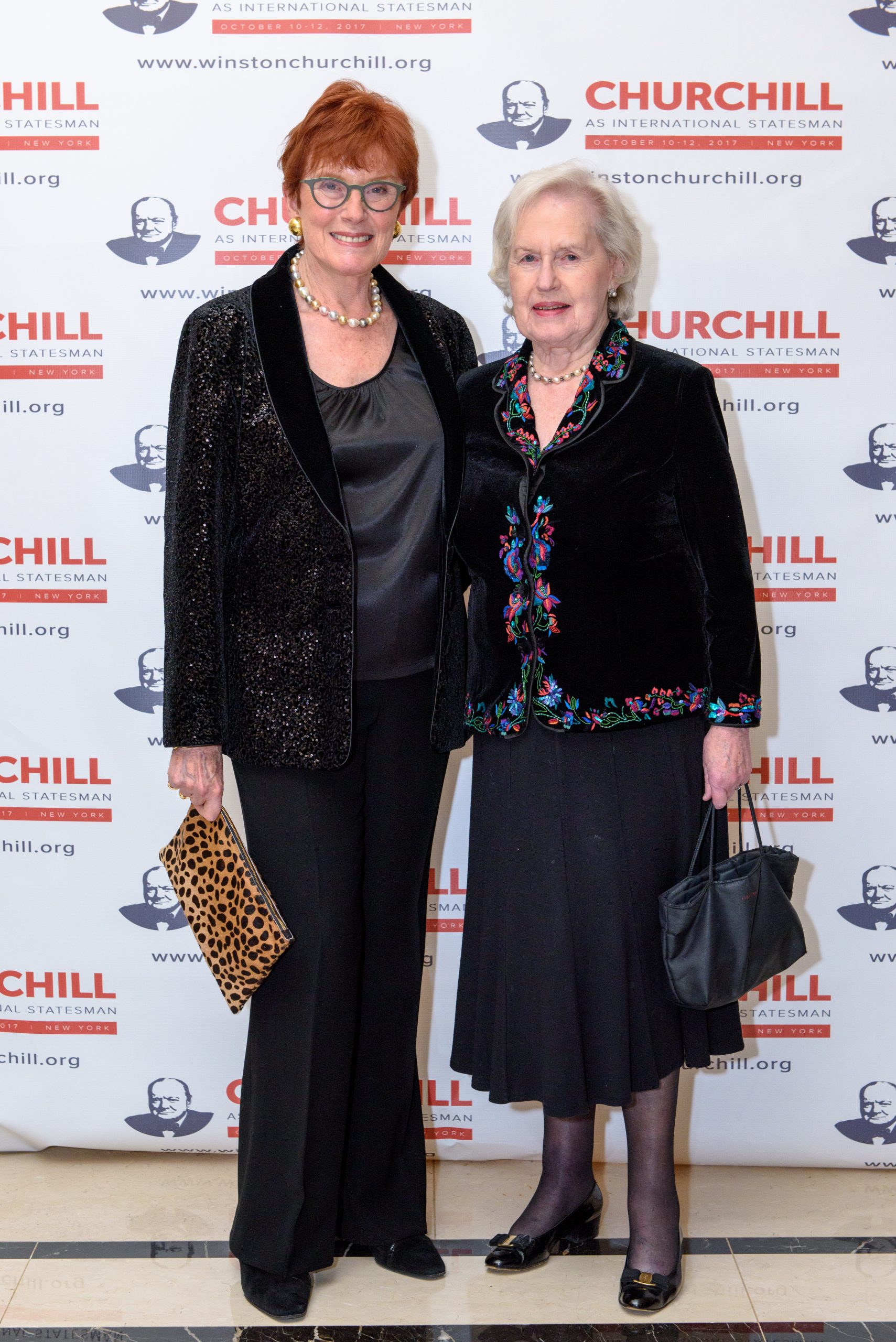
The first international meeting was held in London in 1983. The next two meetings were held in Toronto and Boston respectively. This established the pattern of rotating the annual conference between member countries. The 1985 Boston gathering demonstrated that ICS had “arrived” when it secured as Keynote Speaker the incumbent United States Secretary of Defense Casper W. Weinberger.
High-profile conference speakers became the norm. In the 1980s and ’90s, ICS hosted former members of Churchill’s staff such as Sir John Colville and Sir Anthony Montague Browne. Members of the Churchill family became regular guests, including Lady Soames, Celia Sandys, and namesake grandson Winston, the father of our current president. From the entertainment industry Lee Remick, Gregory Peck, and Robert Hardy, who played Churchill more times than any other actor, all dazzled ICS audiences.
Writers and historians are natural choices to speak about Churchill. The journalism world has been represented by Alistair Cooke, William F. Buckley, Jr., and Chris Matthews. Other speakers have included Pulitzer Prize winning authors William Manchester and David McCullough. Above all, Churchill’s official biographer Sir Martin Gilbert became a regular fixture at ICS events.
In the mid-1990s, ICS began its transition from a purely voluntary organization of enthusiasts to a paid, professional organization seriously dedicated to the mission of teaching new generations about the relevance of Churchill’s life and legacy. An endowment was established, and ICS was chartered as a tax-exempt, non-profit organization focused on education. Free seminars for teachers were organized in Britain and North America to provide them with tools that they could take to the classroom.
New Millennium
Before the internet, virtually every function of ICS had to be carried out through the pages of Finest Hour, which reached members only every three months. For this reason, the Chartwell Bulletin was created as a supplementary quarterly to provide information about the activities of ICS and its local branches, leaving room in Finest Hour for stories exclusively related to Churchill’s life and career.
With the internet, ICS now has a website accessible at any time containing a bonanza of information about all aspects of Churchill. The internet has also enabled ICS to convert the Chartwell Bulletin from a quarterly print journal reaching only paying members into the Churchill Bulletin, an online journal published monthly and sent free to more than 35,000 subscribers. The new “CB” presents stories about contemporary events related to Churchill, while stories about ICS activities have migrated to websites and social media platforms run by individual chapters, which can focus on organizing local members.
In 2010, Laurence Geller became the new chairman of ICS and brought in Lee Pollock as executive director. Together they began the process of realizing a long-held dream of the organization: the establishment of a permanent facility in Washington, D.C., that would become the center of Churchill studies in North America.
The campaign to build the National Churchill Library and Center (NCLC) was launched at the 2013 conference in Washington and began in grand style. At a ceremony held in the historic Statuary Hall of the United States capitol, ICS donated a bust of Winston Churchill that now sits permanently in the Freedom Foyer outside the House of Representatives. Secretary of State John Kerry and all four leaders of Congress spoke at the dedication, after which Roger Daltrey of The Who sang “Stand by Me.”
Kerry has not been the only Secretary of State to be hosted by ICS. George Shultz and Colin Powell had preceded him, and in 2015 Madeleine Albright was presented with the society’s Churchill Leadership Award at a gala dinner in New York’s Waldorf Astoria hotel. Former British Foreign Secretary David Miliband spoke to the audience before Albright sat down for a question-and-answer session with journalist Tom Brokaw.
The following year, the NCLC was opened to great fanfare on the campus of the George Washington University. Michael F. Bishop became the first director and also took over as executive director of ICS from the retiring Lee Pollock. Fittingly the conference culminated with a speech by another top diplomat, former Secretary of State James A. Baker III, at a gala banquet held in the Benjamin Franklin State Dining Room on the top floor of the US State Department. For the first time, conference sessions were broadcast live on C-SPAN, adding another dimension to the ICS public profile.
NCLC
At the start of 2017, the International Churchill Society entered into partnership with the National Churchill Museum on the campus of Westminster College in Fulton, Missouri, where Churchill delivered his famous “Iron Curtain” speech in 1946. Together the NCLC and NCM provide North American counterparts to the Churchill Archives Centre in Cambridge and the Churchill War Rooms in London as important centers for facilitating Churchill studies and relating the continuing importance of Churchill’s legacy to the challenges of today and tomorrow.
Helping to maintain public interest in ICS have been a series of speakers at the NCLC starting with General David Petraeus, who said that he was honored to “walk point” for the new institution. In just the first year, there followed former Pakistani President Pervez Musharraf, former US Ambassador to Britain Matthew Barzun, along with a host of authors including Professor Richard Carwardine speaking about Abraham Lincoln’s sense of humor, Sally Bedell Smith discussing her bestselling biography of Prince Charles, and Felix Klos explaining what he discovered in research for his book about Churchill and European unity. Novelists Mark Helprin and Robert Harris have spoken at the NCLC about their work, while Harvard University’s Maya Jasanoff lectured on the relevance of Joseph Conrad in a global world.
Also in 2017, actor Gary Oldman and director Joe Wright toured the NCLC in conjunction with the release of their film Darkest Hour, which was shown in an advance screening to an audience of 150 Churchillians at that year’s conference in New York City. Oldman subsequently received the Academy Award for Best Actor at the 2018 Oscar ceremony. [See page 50.]
Past, Present, and Future
From a tiny group of philatelists worried about phony stamps, the International Churchill Society has developed into an organization with branches in the United States, Canada, Britain, Australia, New Zealand, Iceland, and Portugal, along with members in many other nations spreading over six continents.
ICS members and journal contributors have included British Prime Ministers Margaret Thatcher, John Major, Gordon Brown, and David Cameron; Canadian Prime Minister Stephen Harper; Australian Prime Minister Tony Abbott; and New Zealand Governor General Sir Jerry Mateparae. In 2013, ICS (UK) presented the Sir Winston Churchill Award to HRH The Prince of Wales.
The example of Churchill’s leadership continues to inspire each new generation. The International Churchill Society exists to promote the legacy of freedom and democracy that he successfully championed. Over the next fifty years, ICS will continue to grow and to innovate in order to educate new generations about the importance of the Greatest Briton.
David Freeman is the editor of Finest Hour. His first contribution to the magazine was a history of the International Churchill Society’s first twenty-five years. He would like to hear from volunteers to write the history of the organization’s first seventy-five years.
Subscribe
WANT MORE?
Get the Churchill Bulletin delivered to your inbox once a month.



